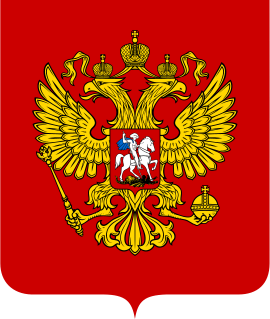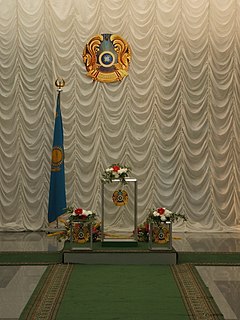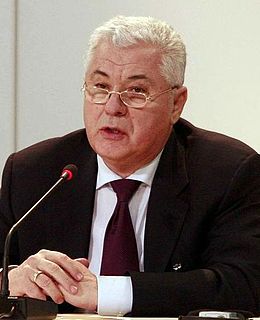
On the federal level, Russia elects a president as head of state and a legislature, one of the two chambers of the Federal Assembly. The president is elected for, at most, two consecutive six-year terms by the people. The Federal Assembly has two chambers. The State Duma has 450 members, elected for five-year terms, using a system of proportional representation, where parties gain a percentage of seats equal to the percentage of national votes they gained, with a 7% threshold required to gain any seats in the Duma. The Federation Council is not directly elected; each of the 85 federal subjects of Russia sends 2 delegates to the Federal Council, for a total of 170 members.

Parliamentary elections were held in Georgia on 2 November 2003 alongside a constitutional referendum. According to statistics released by the Georgian Election Commission, the elections were won by a combination of parties supporting President Eduard Shevardnadze.

Belarus elects on national level a head of state - the president - and a legislature. The president is elected for a five-year term by the people. The National Assembly has two chambers. The House of Representatives has 110 members elected in single-seat constituencies elected for a four-year term. The Council of the Republic has 64 members, 56 members indirectly elected and eight members appointed by the president.

Elections in Kazakhstan are held on a national level to elect a President and the Parliament, which is divided into two bodies, the Majilis and the Senate. Local elections for maslikhats are held every five years.
Parliamentary elections to the Assembly of Kosovo have been held four times since 1999 with the latest in December 2010. The Assembly was an institution within the Provisional Institutions of Self-Government (PISG) established by the United Nations Interim Administration Mission in Kosovo (UNMIK) to provide 'provisional, democratic self-government' in advance of a decision on the final status of Kosovo. Kosovo, formerly a province of Serbia, came under UN administration in 1999 and unilaterally declared its independence in February 2008. The Assembly elected in 2007 continued in office after the declaration of independence.

The 2008 Russian presidential election was held on 2 March 2008, and resulted in the election of Dmitry Medvedev as the third President of Russia. Medvedev was elected for a 4-year term, whose candidacy was supported by incumbent President Vladimir Putin and five political parties, received 71% of the vote, and defeated candidates from the Communist Party of the Russian Federation, the Liberal Democratic Party of Russia and the Democratic Party of Russia.

Legislative elections were held in the Russian Federation on 2 December 2007. At stake were the 450 seats in the 5th State Duma, the lower house of the Federal Assembly of Russia. Eleven parties were included in the ballot, including Russia's largest party, United Russia, which was supported by President of Russia Vladimir Putin. Official results showed that United Russia won 64.3% of the votes, the Communist Party of the Russian Federation 11.6%, the Liberal Democratic Party of Russia 8.1%, and Fair Russia won 7.7%, and none of the other parties won enough votes to gain any seats.

The 2005 Nagorno-Karabakh parliamentary elections were held in the internationally unrecognised Nagorno-Karabakh Republic on 19 June 2005. The election saw the two pro-government parties, the Democratic Party of Artsakh and Free Motherland, win a large majority of seats. The opposition criticised the conduct of the election but international election monitors generally praised the election.

Presidential elections were held in Armenia on 19 February 2008. Prime Minister Serzh Sargsyan was elected in the first round according to official results, but this was disputed by former President Levon Ter-Petrosyan, who was officially placed second.

Parliamentary elections were held in Georgia on May 21, 2008. President Mikheil Saakashvili proposed a referendum on bringing them forward from October to April after the 2007 Georgian demonstrations. The referendum was held at the same time as the early presidential election on 5 January 2008; according to exit polls, voters were largely in favour of having the elections in spring.

Parliamentary elections were held in Moldova on 5 April 2009. The Party of Communists of the Republic of Moldova (PCRM) won a majority of seats for the third consecutive occasion. Turnout was 59%, exceeding the 50% necessary for the election to be valid.

The 2003 Armenian Presidential election took place in Armenia on 19 February and 5 March 2003. No candidate received a majority in the first round of the election with the incumbent President Robert Kocharyan winning slightly under 50% of the vote. Therefore, a second round was held and Kocharyan defeated Stepan Demirchyan with official results showed him winning just over 67% of the vote. However both the opposition and international observers said that the election had seen significant amounts of electoral fraud and the opposition did not recognise the results of the election.

Presidential elections were held in Armenia on 16 March 1998, with a second round on 30 March. The result was a victory for independent candidate Robert Kocharyan, who won 58.9% of the vote in the second round. Turnout was 63.5% in the first round and 68.1% in the second.

A parliamentary election was held in the unrecognized Nagorno-Karabakh Republic on 23 May 2010.
Parliamentary elections were held in Azerbaijan on 7 November 2010.

Parliamentary elections were held in Kazakhstan on 15 January 2012. The result was a victory for the Nur Otan party, which won 83 of the 98 seats in the Mazhilis. However, the Organization for Security and Co-operation in Europe (OSCE) stated that the election "did not meet fundamental principles of democratic elections."

A parliamentary election was held on May 6, 2012 in Armenia.

Presidential elections were held in Georgia on 27 October 2013, the sixth presidential elections since the country's restoration of independence from the Soviet Union in 1991. The last elections in January 2008 resulted in the re-election of Mikheil Saakashvili for his second and final presidential term. Saakashvili was constitutionally barred from running for a third consecutive term.

Parliamentary elections were held in Armenia on 2 April 2017. They were the first elections after a constitutional referendum in 2015 that approved reforms for the country to become a parliamentary republic. The result was a victory for the ruling Republican Party of Armenia, which won 58 of the 105 seats in the National Assembly.

Snap parliamentary elections were held in Armenia on 9 December 2018, as none of the parties in the National Assembly were able to put forward and then elect a candidate for Prime Minister in the two-week period following the resignation of incumbent Prime Minister Nikol Pashinyan on 16 October. They were the first elections after the 2018 revolution and the country's first-ever snap elections.
















